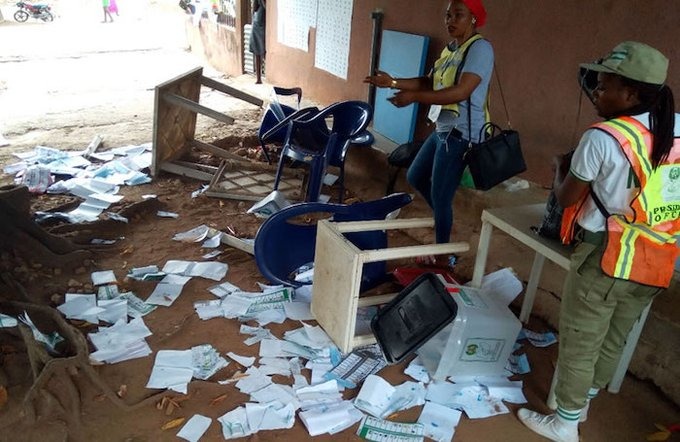Senator Ike Ekweremadu, his wife, and a “middle-man” have been found guilty of an organ-trafficking plot in the United Kingdom. The findings of the court are not surprising to me, as I noted when the senator and his wife were arrested last year.
In many cases of trafficking, particularly those involving high-profile individuals, there tend to be a few common misconceptions that are relevant to this situation.
• Status: People have this misconception that traffickers can only be “those people” – known criminals or people displaying criminal tendencies. This is not true. Trafficking is about power, vulnerability, and control. A trafficker is simply a person that benefits directly or directly off another person by force, fraud, or coercion. Traffickers can be family members. They can be friends. And they can be professionals. In a report by Polaris which I co-authored – “Human Trafficking at Home: The Labor Trafficking of Domestic Workers” – the highest category of employer-traffickers were diplomats on A-1 and G-1 visas. As we note in the report, it is possible that they were the highest category because they were easy to identify. But I share this to dispel the notion that just because someone is a professional, has a high-paying job, or things like that, they cannot be traffickers. Not too long ago here in the United States, you will recall that Jeffrey Epstein, a wealthy American Financier, was charged with sex trafficking. Although he died before his case was concluded, his friend, the wealthy socialite, Ghislaine Maxwell, was convicted of sex trafficking last year. Status does not prevent a person from being a trafficker.
• Visa procurement: Helping a person enter a country legally through an entry visa (and not smuggling) does not mean that their contact will not traffic them. In addition to the report I have mentioned already, Polaris has another report, “Human Trafficking on Temporary Work Visas: A Data Analysis 2015-2017,” that profiles trafficking victims who had visas. Traffickers will bring people into a country legally and then withhold their passports, threaten them with deportation regularly, and allow their visas to expire to put them at risk for trafficking. So no, applying for a visa for a person does not mean that there is no intention to traffic them.
• Victim age: there is a misconception that adults cannot be trafficking victims; however, a person can be a trafficking victim at any age. The recruitment tactics of traffickers are known to include “misrepresentation of opportunities” and “posing as benefactors.” If you are looking for a job and someone says I have this job that will pay you this amount of money, won’t you take it? If you find out that they are not paying you what they said, you should leave, right? But not if they have threatened you, they are holding onto your documents, or you feel like you have nowhere else to go. Someone not being a minor does not automatically translate to them not being a trafficking victim.
Advertisement
• Caring Father: There is nothing wrong with being a caring father. But when you “target” a vulnerable person, when there is a power imbalance between you and that person, they can hardly stand up to you. There are more acceptable ways for obtaining a kidney – to seek, informed donors. A doting father should seek people who are in an empowered position to make organ donation decisions without being influenced by their vulnerability.
There are three elements that must be present for a trafficking conviction in most cases here in the United States – “Act” “Means” and “Purpose.” (AMP). I said most cases because you don’t need to prove “means” in the case of sex trafficking of a minor. But back to AMP. There appears to be “purpose” – there was a need for an organ donation. There has been the “act” – the alleged victim was recruited and transported. What the prosecution would need to prove is the “means,” – which would be the equivalent of what is regarded as “force, fraud, or coercion” here in the United States.
Coercion is not that you tied a person’s hand, or you held a gun to their head. If I am poor, and you offer me a meal in exchange for sex, that is coercion. Note that this is not greed. If a person has food to eat, or somewhere to stay, and I’m trading sex for what you offer me, you can say the person is being greedy. But when the choice is between going with you or sleeping at the bus stop, no, that is not greed. That is coercion. What was the actual condition of the alleged victim? What was he offered? What was he told? How free was he to walk away from the offer? These are some of the many questions that will determine the outcome of the case.
Advertisement
While the “supposed donor” was never held at gunpoint, during the case, it was revealed that he had been offered £7,000! He was not advised on the risk of surgery and post-surgery care.
At the time of the arrest, a significant number of people were saying categorically that this can’t be a trafficking case because of the status of the alleged trafficker, the age of the alleged victim, and the presence of a legal visa application.
This conviction emphasizes that when there is a relationship with power dynamics where one person, such as an employer or a benefactor, has the upper hand, the more powerful person is not absolved of wrongdoing by providing partial information to their beneficiary. It is not enough to share the benefits of an offer without sharing the consequences.
The conviction also debunks many myths about trafficking, including that – traffickers have to be career criminals, victims have to be forcefully restrained, and applying for a legal visa for a person prevents trafficking.
Advertisement
Agbeyegbe is a public health professional expert in the field of human trafficking and intimate partner violence in Silver Spring, Maryland.
Views expressed by contributors are strictly personal and not of TheCable.
Add a comment







